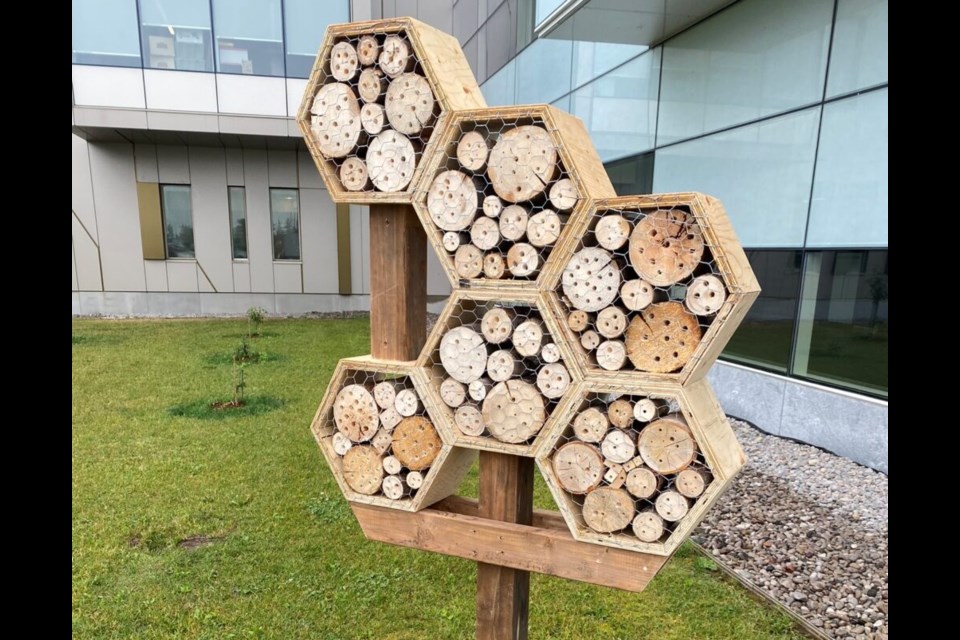“For so work the honey bees, creatures that by a rule in nature teach the act of order to a peopled kingdom.” — William Shakespeare
Our summer semester is in full swing, and the campus at Georgian College is buzzing.
There is a new community being built on campus, and with the help of our partners, Michael der Kinderen and Melissa Greenwood at Derkwood Beekeeping Supplies, there is a new queen bee in town.
In support of the school’s commitment to the United Nations Sustainable Development Goals, Georgian has joined the ranks of colleges and universities across North America to become a Bee City Canada ‘Bee Campus.’
Bee City Canada’s story begins in 2015, when the founder, Shelly Candel, first discovered the important work of Bee City U.S.A. while visiting Oregon.
Inspired by their success and the idea that cities can become champions for pollinators, she returned home determined to find a way to engage Canadian cities, towns and other communities in this important cause.
The idea of a Bee City caught on right away with Toronto city council voting unanimously to become the first Bee City in Canada in March 2016.
By the end of 2021, more than 150 cities, schools, campuses and businesses had joined, underscoring Bee City’s message had resonated with Canadians and that communities across the country were ready to take action to protect our pollinators and preserve the beauty of nature.
There are currently more than 90 Bee Campuses in Canada and Bee City U.S.A.
Here at home, following the launch of the Simcoe County Honey Trail in 2018, Tourism Simcoe County started to expand from the smaller Simcoe County Honey Trail to a county-wide bees and honey program, which draws attention to how important pollinator health is to the whole of Simcoe County.
Honey bees and other pollinators are vital to our ecosystem and are an integral part of maintaining our natural biodiversity. Bees pollinate most plants we rely on, including many nuts, vegetables and fruits. By creating habitats, such as pollinator gardens and no-mow zones, we can help bees to thrive.
It’s projects like these that help support our efforts to develop the “edible campus landscape” and grow the hospitality, tourism and recreation urban agriculture projects at Georgian College.
Bees and honey production are an amazing addition to our school. The benefits to the landscape and the ability to produce our own honey give us a great opportunity to share this experience with our students and inspire an interest in protecting our environment.
Chefs and cooks love honey as an ingredient. It has so many applications as a natural sweetener.
Health benefits aside, you cannot argue the flavour of good local honey brings a lot to the plate. Summer dishes call for a delicate complement to the fresh produce and summery flavours of the season’s most inspired recipes.
That’s where a classic honey vinaigrette comes in. It is the ideal dressing for the season.
This dressing won’t overpower your dish. Whether it’s on a salad or adding a little zing to a sandwich, it enhances, but doesn’t overwhelm. You’ll want to serve this immediately, but you can make it a few days in advance of serving.
This dressing is versatile. It is simple, and perfect for customization. The recipe is a wonderful base for other combinations of oil, vinegar, and sweet syrups. You could even substitute maple syrup for the honey.
Sweet summer honey vinaigrette
Ingredients
- ½ cup canola oil
- ⅓ cup white balsamic vinegar
- 2 tablespoons honey
- 2 teaspoons minced red onion or shallot
- ¼ teaspoon kosher salt
- ¼ teaspoon black pepper
Directions
- Combine all ingredients in a clean jar. Cover with lid and shake until fully blended.
- Use immediately, or chill until ready to use.
Our team in hospitality, tourism and recreation is excited to share and help educate our Georgian students, staff and community on the importance of pollinators.
The goal is a future where we have created beautiful pollinator habits on campus to increase the biodiversity of our edible landscapes and reduce our carbon footprint.
This summer, I hope you all have a chance to drop by our hospitality, tourism and recreation garden, on the corner of M Building, closest to Georgian Drive, and our pollinator garden between buildings H and N and see the great things growing there. Be sure to say hi to chef Julien or chef Vince when you see them out there, and mind the bees.
Have a safe and happy summer.
